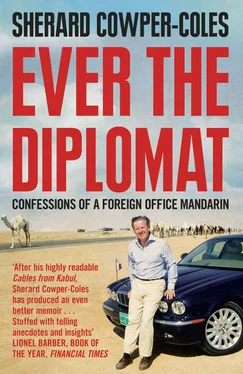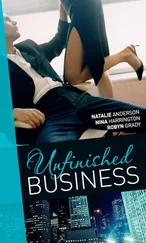But I had a real job to do. As what was then called a ‘Grade 8’ new entrant, a third secretary, I was taking over from an experienced first secretary, Alan Goulty, an Arabist in his early thirties with several overseas postings under his belt. I would have to work hard to fill his shoes. Alan taught me straight away the two unwritten rules of the Foreign Office. The first – never knock on any doors – is meant to reflect complete trust among diplomats, but still leads to many embarrassing incidents. The second – call everyone by his or her first name, except ministers, ambassadors and the Permanent Under Secretary – seemed revolutionary in 1977: at twenty-two, I had great difficulty in addressing a fifty-nine-year-old deputy under secretary as ‘Antony’, let alone ‘Tony’. The only other occupant of my first office, sitting opposite me, was a diplomat even more experienced than Alan Goulty. Michael Hodge had joined the Prison Commission as a clerk, but, having proved himself at policy work, had transferred after only a year to the Foreign Service (as it was then) as a junior diplomat. I dealt with Ireland (or the Republic of Ireland as the Diplomatic Service formbook taught us to call it: ‘Irish Republic’ implied a republic embracing the whole island). Michael handled overseas interest in Northern Ireland – mainly forty million Americans claiming Irish descent. Michael gave me more wise advice than he will ever remember, about drafting, about what he called officemanship, about good and bad postings, and about good and bad ambassadors. As an incentive to stay the course, Michael shared his memories of foreign service, ranging from repatriating, in a shoe box, the remains of a British citizen killed in Uganda whose cremation Michael had had to perform, to travelling the Gulf as personal assistant to the Political Resident, Sir Geoffrey Arthur, during the last year – 1971 – of Britain’s quasi-colonial presence there.
Together, Michael and I made up what was called the ‘Third Room’ of the standard Foreign Office political department of the time. In the hierarchy above us, in rooms of their own (presumably the second and first rooms, though we never used the term), sat the Assistant (or deputy head of the department) and the Head of Department.
A fourth room contained two alarmingly efficient Foreign Office secretaries. Both took shorthand, but not from someone as junior as me. In a fifth and final room two clerks slaved away, carefully registering all the department’s papers, before placing them on files established according to a centralised system overseen by the Chief Registrar of the Foreign Office – the high priest of the cult of the file. Apart from the fact that most, but by no means all, papers were now typed, little can have changed since Victorian times.
I had my first lesson in pushing paper: the approved way to attach one paper to another was to punch a hole in the top left-hand corner of each, half an inch in from the top and side, and then to pass a tag through the holes. Paperclips become detached, or attached to the wrong papers; staples are a fiddle to unpick. In the Foreign Office then, as now, the India tag, aka the Treasury tag, ruled supreme: two small metal, later plastic, bars, joined by a miniature red cord. With the India tag went the key instrument of bureaucratic order: the hole punch – always in short supply, often purloined, never to be let out of sight, the only property I have ever ‘liberated’ from the Foreign Office.
My first Assistant (and therefore boss) was a kind and careful official, Peter Wallis, who had come to the Foreign Office via HM Customs & Excise. He took endless trouble to improve my drafts. We used special blue drafting paper, with wide margins for corrections. In those leisurely days, almost everything we wrote was prepared first in draft, in type or handwriting. Most serious pieces of work on Britain’s relations with Ireland started on my desk, as a draft by me. As that draft moved up the chain, it would change beyond recognition. But, as the new boy in the Department, I was the bureaucratic focus for Britain’s bilateral relationship with Ireland. I was the continuity person, the official responsible for knowing which plates we had in the air at any one time, and for keeping them there. It was at once exhilarating and intimidating. After university, the most difficult thing, by far, was dealing with a dozen real problems at once, rather than the single subject of that week’s essay.
We were told that the core of our job was influencing foreigners, in the British interest. In order to do so, we needed first to understand them, and then to put our messages in terms that would have the best chance of being absorbed and acted upon by those we were trying to persuade to do what HMG wanted them to do. Clear thinking equalled clear writing. And clear writing was most effective in explaining to ministers in London the realities of any particular foreign policy challenge, and of ensuring that the instructions resulting from our analysis had some effect. All this explained why the Foreign Office attached so much importance to ‘drafting’, and why, in my first job in London, and my second in Cairo, each of my bosses took such trouble to go through my drafts and improve them. And at the heart of all this – the lifeblood of any decent diplomatic machine – was and is the telegram: a collective classified message, as tautly drafted as possible, sent from overseas posts to London, and vice versa.
That was why in the autumn of 1977 we new entrants to the Diplomatic Service were told, only half jokingly, that, like the fountains in Trafalgar Square, Foreign Office officials operated only from ten till six. We didn’t need to arrive in King Charles Street before ten o’clock, because that gave time for the distribution, around the Office and Whitehall, of the overnight telegram traffic pouring into London via the former Diplomatic Wireless Service station at Hanslope Park, near Milton Keynes. The first thing we did each morning was read the telegrams.
I soon learned that Foreign Office life is a continual merry-go-round of postings, for yourself and for your colleagues. After only a few weeks Peter Wallis was posted, on promotion, to Ankara. He was succeeded by one of the most accomplished eccentrics of the Foreign Office of that time – an official who was anything but careful.
Trevor Mound was a minor hero to my generation in the Foreign Office. In idiosyncratic fashion, he encapsulated one of the attributes the writer and diplomat Sir Harold Nicolson had said were essential for success in diplomacy: a sense of proportion, but leavened with a sense of humour. Trevor never ever panicked. And he always saw the funny, often absurd, side of everything.
The son of a small Worcestershire farmer, Trevor had joined the Army as a private soldier without going to university. He had begun in the Guards, but before long he had been commissioned into the Parachute Regiment. Well over six feet tall, he had the erect bearing of the Foot Guard he had once been. A long thin face was framed by a sweep of reddish hair on top, and a small pointed ginger beard at the bottom, set off by twinkling blue eyes and an ever present smile. He could easily have been a late-nineteenth-century French novelist-adventurer. He was always immaculately turned out, in hand-made black jodhpur boots and deep-cut three-piece suits, with all sorts of extra features, including more pockets than anyone could ever use, and cuff buttons that really undid. Every day Trevor wore a cream silk shirt and a blue-red-blue Brigade tie, even though most of his military service had in fact been with the Paras. He had an OBE after his name, but would never say for what. There was an air of charmingly seductive mystery about him. Much married (or so he liked us to think), he loved women, fine wine and fun.
Читать дальше












